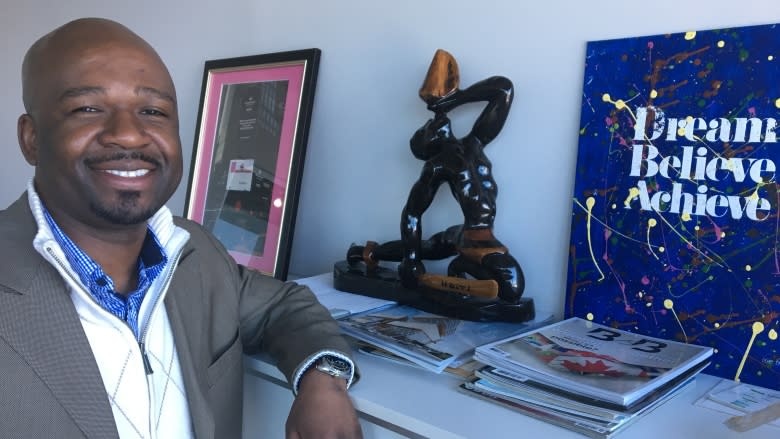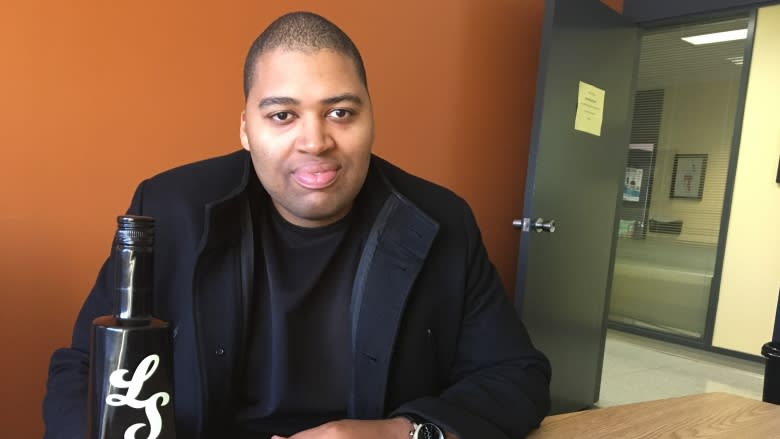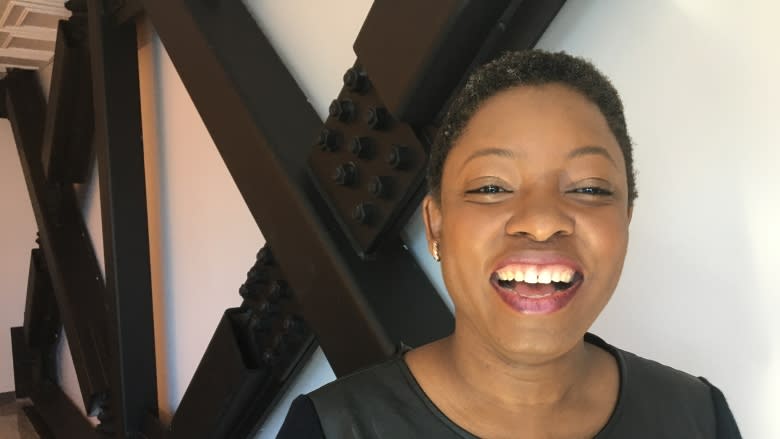Putting a label on black-owned businesses
Many consumers seek out labels on businesses and products before making spending decisions: Fair Trade, Organic, Women Owned, Made in Canada — the list is long.
Some business leaders in Montreal say there is now a need for a label to identify black-owned businesses.
They are working to develop a certification process for a black-owned label, and they want that label to become a symbol of excellence.
Daybreak's Shari Okeke met with Montrealers behind the push for a black-owned business label to find out more about their plan.
Frantz Saintellemy, founder and CEO of Groupe 3737
Frantz Saintellemy showed me the label on his Italian-made blazer, telling me he buys kosher, he buys halal, he consciously looks for certain labels when he shops.
"Labels are very good. I buy women-owned because it's important to me, it's important to my kids and my wife, if I can, to contribute whereever I can," Saintellemy said.
Here are some other stories by CBC's Shari Okeke:
The founder and CEO of Groupe 3737, an incubator for entrepreneurs located in Saint-Michel, Saintellemy is one of the Montreal business leaders behind a push for a black-owned business label.
He's familiar with the argument that a black-owned label may appear to some as limiting, and he firmly disagrees.
"There's no such thing as cornering yourself with a black label. I see it as an opportunity to recognize excellence," he said.
"The businesses that are going to be part of this black label are going to be as good, if not better, than any other label that's out there, and that's our goal."
Saintellemy and his wife and business partner, Vickie Joseph, aspire to help build wealth in black communities.
Groupe 3737 caters to immigrant and visible-minority entrepreneurs, offering support in networking and in gaining access to financing.
Saintellemy and Joseph want to extend their approach beyond their own companies, to help as many black entrepreneurs as possible, and they believe identifying businesses as black-owned will help.
"A thriving Saint-Michel is not only good for black people. It's good for Latinos, it's good for Italians, it's good for Québécois — it's good for Canadians, in general," Saintellemy said.
Stevens Charles, CEO of LS Cream
At 34, Stevens Charles is working hard to make his dream business profitable.
His award-winning cream liqueur, LS Cream, is distributed by the SAQ and is sold in the United States.
Charles is focused on expanding with new marketing campaigns planned for the U.S.
But it's still a struggle. He calculates it will be about four years before LS Cream makes money, and he says mentorship, more than a black-owned label, is what would help him right now.
"I'm sure that somebody in the black community in Montreal doesn't know about LS Cream," said Charles. "Maybe he could help me get to where I need to go."
"Having a label on LS Cream, a black label of excellence, that's fine. But that's not what's going to make me profitable faster," he said.
Only recently did Charles come to realize that Groupe 3737 offers support to young black entrepreneurs, just like him.
He said before creating a label for black-owned businesses, the priority should be closing that gap in knowledge about the work peers are doing in the black community.
"If we had a black-owned radio station with everything that reflects us, that to me would be … a bigger step because we need to learn about each other," he said, as it can be a struggle to get coverage in mainstream media.
Kerlande Mibel, president of International Black Economic Forum
Kerlande Mibel is president of the International Black Economic Forum, a think tank focused on accelerating wealth creation in black communities.
The idea of a black-owned business label originally came from workshops at the International Black Economic Forum held in Montreal last fall.
Mibel clearly wants people within black communities to think about where they are spending their money, and he says establishing a label is key to helping them choose to support businesses within those communities.
"Black women spend at least $300 a month for their hair, so why don't you spend that within a black business? Instead of buying L'Oréal, why don't you buy Kariliss.... or [from] other businesses that are black-owned?" Mibel said.
She says it's about creating wealth and creating jobs because black communities cannot rely on government help to solve their economic problems.
The hope is that consumers from all communities will want to support black entrepreneurs.
"Help them have thriving businesses. It has nothing to do about segregation.... It has everything to do with taking care of ourselves and improving our lifestyles, and while we do that, Quebec will benefit, Canada will benefit," she said.
Mibel is convinced that once the label is created, it will attract consumers beyond black communities.
"There's a lot of non-black people that would like to support black businesses," she said.
Mibel says a publicity campaign will be launched later this year, and she expects the label to appear by 2018.
It will be available in 20 to 30 cities in Canada, the United States, Brazil, France and in various African countries.
"We're really excited. There's a lot of people [outside Montreal] asking us about it."
"People are ready for that."




